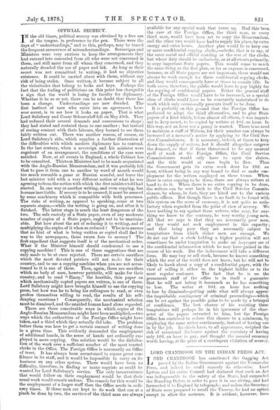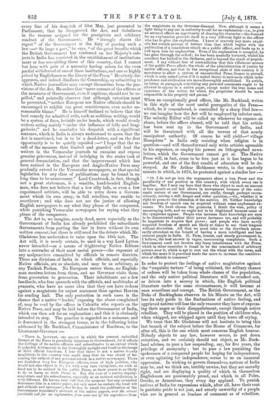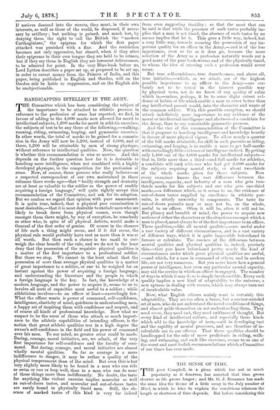LORDCR ANBROOK ON THE INDIAN PRESS ACT.
LORD CRANBROOK has sanctioned the Gagging Act passed by the Indian Government against the Vernacular Press, and indeed lie could scarcely do otherwise. Lord Lytton and his entire Council had declared that such an Act was indispensable to the safety of the State, had suspended the Standing Orders in order to pass it in one sitting, and had forwarded it to England by telegraph ; and unless the Secretary of State were prepared to recall the Viceroy, he had no option except to allow the measure. It is evident, however, from
every line of his despatch of 31st May, just presented to Parliament, that he disapproved the Act, and disbelieves in the reasons assigned for the precipitate and arbitrary conduct of the Government. He "strongly shares the regret" of the Government at the duty of passing such a law So large a part," he says, "of the great benefits which the British Government has conferred on her Majesty's sub- jects in India has consisted in the establishment of institutions more or less resembling those of this country, that I cannot but hear with pain of a necessity having arisen for the even partial withdrawal of one of these institutions, and one so highly prized by Englishmen as the liberty of the Press." He utterly dis- approves, and indeed disallows the Censorship, Liy submitting to which Native journalists may exempt themselves from the pro- visions of the Act. He orders that "mere censure of the officers or the measures of Government, even if captious, should not be re- pelled," and pointedly observes that although extortion must be prevented," neither European nor Native officials should be encouraged to exhibit too great sensitiveness, even under un- reasonable blame." He is himself inclined to believe that the best remedy for admitted evils, such as seditious writing, would be a system of fines, leviable under bonds, which would steady writers acting mainly "under the influence of folly and brag- gadocio ;" and he concludes his despatch with a significant sentence, which in India is always understood to mean that the Act is sanctioned, but is to be a dead-letter, and on the first
opportunity is to be quietly repealed I hope that the re- sult of the measure thus limited and guarded will lead the writers in the Vernacular journals to examine and expose genuine grievances, instead of indulging in the easier task of
general denunciation, and that the improvement which has been noticed in the European and Anglo-Native Press may gradually extend to the Vernacular newspapers, so that special legislation for any class of publications may be found in no long time to be unnecessary." Lord Cranbrook, in fact, though not a great statesman, is a sensible, hard-headed English- man, who does not believe that a few silly lads, or even a few experienced satirists, will be able to write down a Govern- ment which its own army, in full rebellion, was unable to overthrow ; and who does not see the justice of allowing English newspapers to say what they please of the conquered, while punishing Vernacular newspapers for saying what they please of the conquerors.
The Act is, we imagine, nearly dead, more especially as the Government of India has already prohibited the subordinate Governments from putting the law in force without its own written consent, but there is still need for the debate which Mr. Gladstone has undertaken to raise upon the 16th inst. The Act will, it is nearly certain, be used in a way Lord Lytton never intended—as a means of frightening Native Editors into a surrender of their most useful power—the exposure of any malpractices committed by officials in remote districts. There are divisions of India in which officials, and especially Native officials, are as absolute, and may be as arbitrary, as any Turkish Pashas. No European enters them, no English- man receives letters from them, and no Governor visits them from generation to generation. Their inhabitants are a few landlords, who fear quarrels with the officials, and multitudes of peasants, who have no more idea that they can have redress against a magistrate for unjust sentences than against Heaven for sending hail. The only protection in such cases is the chance that a native "leader," exposing the abuse complained of, may be read by the officer in Calcutta who reports on the Native Press, and may be laid before the Government of India, which can then ask for an explanation ; and this it is obviously intended to stop. The practice is regarded as a nuisance, and is denounced in the strongest terms, as in the following letter addressed by Mr. Buckland, Commissioner of Burdwan, to the Lieutenant-Governor
There is, however, one aspect in which the present unbridled licence of the Press is peculiarly injurious to Government, for it affects the feelings of its native officers and subordinates to an extent which is palpably detrimental to the thoroughly upright and fearless discharge of their official functions. I fear that thereis not a native deputy magistrate in the country who could deny that he was afraid of be- coming the subject of any personal attack in a native newspaper. There are doubtless very few European officers, even of high position, who would not also object to it ; for with very rare exceptions, we wish at least not to be noticed in the public Press, as their praise is as likely to do us harm as their blame is. But the Case of a native deputy- magistrate and his subordinates, especially at an isolated subdivision, is very different. He knows very uell that the moment that any scoundrel denounces him in a native paper, not only must he endure the local wit and ridicule and annoyance, but he has to await the publication of the Government translator's abstract of the native papers, and the almost inevitable call for an explanation from some one of his superiors—from the magistrate to the Governor-General. Now, although it seems a light thing to any one in authority to call for an explanation—i.e., to give an accused officer an opportunity of clearing his character—the demand for an explanation presents itself in a very different light to the officer who has to give the explanation. I know of scarcely any more exqui- site but certain process of torture than that which begins with the publication of a scandalous attack on a public officer, and leads up to a call upon him for explanation. Even if his explanation is accepted, he has gone through the ordeal; he has been mentally tortured, whilst his assailant has lurked in the darkness, and is beyond the reach of punish- ment. I say without fear of contradiction that this villainous misuse of the public Press affects the whole of the administration of justice by native officers, and that in the exceptional state of this country it is monstrous to allow a system of uncontrolled Press licence to prevail, which is only suited (even if it is suited there) to nations in which inde- pendence and civilisation are more thoroughly established. No article, no letter, or paragraph containing any personal comments ought to be allawed to appear in a native paper, except under the true name and signature of the writer, for which the proprietor should be made responsible in his property and person."
When an exceptionally good officer, like Mr. Buckland, writes in this style of the most useful prerogative of the Press— which, be it remembered, is controlled by a sharp libel law— we can imagine how the Act will be employed by inferior men. The unlucky Editor will be called up whenever he exposes an abuse, before the officer abused, will be told that his article has been sent up to the Government of India, and will be threatened with all the terrors of that nearly omnipotent authority. Of course he will yield—" village Hampdens " in India only resisting when religion is in question—and will thenceforward only write articles agreeable to his superiors, or employ his powers on lithographed news- letters, which the Government cannot get at. The Native Press will, in fact, cease to be free just as it has begun to be powerful, and one of the first results of education will be de- stroyed. As Sir Arthur Hobhouse wrote, in the masterly minute in which, in 1876, he protested against a similar law
19. I do not go into the arguments about a free Press and the peculiarity of our position in this country, with which every one is
familiar. But I may say here that those who object to such an amount of free speech as our law allows in newspapers because of the auto- cratic nature of our Government, are really, though perhaps uncon- sciously, raising a still deeper and wider question,—viz., whether it is right to promote the education of the natives. 20. Neither knowledge nor freedom of speech can be acquired without some unpleasant ex- cesses. We have chosen the generous, I think the wise, policy of encouraging both, and we ought not to be frightened because some of the symptoms appear. People who increase their knowledge are sure to be discontented unless their power increases too, and will probably be impatient to acquire that power ; and people who have newly acquired freedom of speech are likely at times to use their tongues without discretion. All that we must take as the drawback neces- sarily attendant on the benefit of having a more intelligent and less reticent people in India. 21. Firm, honest, and steady government is, I believe, the best answer to vague, unreasoning complaints. Such a Government need not involve any fussy interference with the Press, which in other countries is found to be the concomitant of arbitrary powers over it, which is apt to root out the wheat with the tares, and which the more it is practised tends the more to increase the sensitive- ness of officials to comment."
In order to protect the feelings of native magistrates against the "exquisite torture "of being criticised, the solitary chance of redress will be taken from whole classes of the population, and the only native political literature will be crushed out, or driven into a secrecy in which, like English political literature under the same circumstances, it will become at once scurrilous and corrupt. The British Government, as the Duke of Buckingham observes in his Minute on the Act, will lose its only guide to the fluctuations of native feeling, and aggrieved natives will lose the only resource they have of express- ing their anger or their disappointment, except through active rebellion. They will be placed in the position of children who, when whipped, are whipped again until they leave off crying.
We trust that Mr. Gladstone will not hesitate to bring this last branch of the subject before the House of Commons, for after all, this is the one which most concerns English honour. Nobody objects to any law, however severe, to put down extortion, and we certainly should not object, as Mr. Buck- land advises, to pass a law suspending, say, for five years, the privilege of anonymity ; but to pass a law punishing the spokesmen of a conquered people for hoping for independence, or even agitating for independence, seems to us an immoral oppression. In wishing to govern themselves, natives of India may be, and we think are, terribly unwise, but they are morally right, and are displaying a quality of which in themselves Englishmen are passionately proud, and which in all Poles, Greeks, or Armenians, they every day applaud. To punish natives of India for expressions which, after all, have their root in patriotic pride is not just, and utterly unworthy of a people who are in general as fearless of comment as of rebellion. If natives descend into the streets, they must, in their own interests, as well as those of the world, be dispersed, if neces- sary by artillery ; but nothing is gained, and much lost, by denying them the right to call the British the "modern Carthaginians," the epigram for which the first paper attacked was punished with a fine. And the restriction becomes not only oppressive, but absurd, when if they utter their epigrams in their own tongue they are held to be crimes, but if they say them in English they are innocent deliverances, to be admired for point. In the very Blue-book before us, Lord Lytton describes a paper set up, or proposed to be set up, in order to extort money from the Princes of India, and this paper, being published in English and Oordoo, will on the Oordoo side be liable to suppression, and on the English side be unobjectionable.




































 Previous page
Previous page